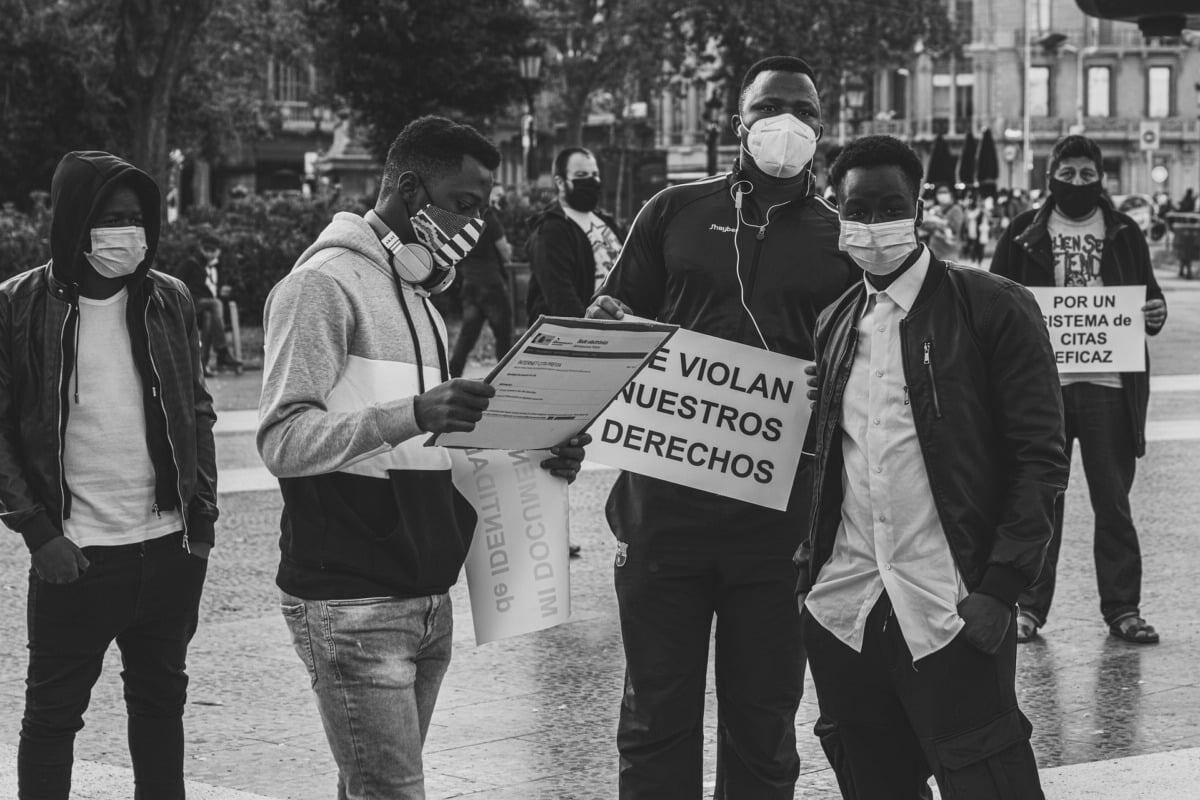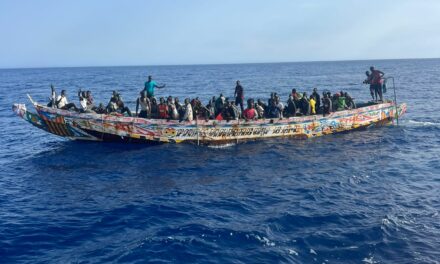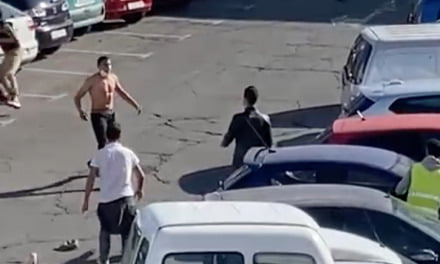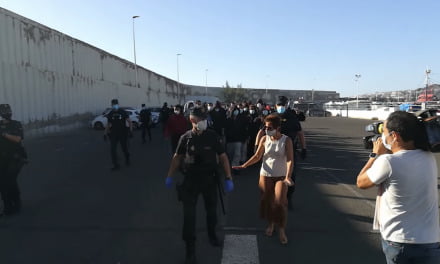A passport and an asylum application are sufficient documents for any migrant to legally travel from the Canary Islands to mainland Spain. This fact, under the law, was formally recognised by a judge at the Contentious-Administrative Court number 5, in Las Palmas de Gran Canaria, this week. The magistrate, Ángel Teba, concluding the hearing, ordered the Jefatura Superior de Policía (Canary Islands’ Policia Nacional Headquarters) to allow a migrant, who was trying to travel from Gran Canaria to Barcelona on December 11, 2020, to fly. According to this ruling, seen by Independent Journalism Spanish Language news portal CanariasAhora, the man had been detained, along with 21 other people, at the airport because “they had a return resolution in force, in order to either proceed with their repatriation within 72 hours, or requesting they be detained at a CIE.” (Centro de internamiento de extranjeros – A foreigners’ internment centre)
Reporting: Timon .:. – Image by Antonio Cansino
The lawyer of the Secretariat of Migration of the Diocese of the Canary Islands, Daniel Arencibia, described feeling “very excited” by the judgement because “for months we have seen very gross breaches” by the police who, he pointed out, “are [meant] to fulfil rights, not to violate them.” He insisted that “no one can be left imprisoned on an island and deprived of their liberty without judicial authorisation.” In any case, he says, the order is precautionary and so there is still a possibility of appeal. But, while it is in force, he hopes that the Police will apply the principle of equality before the law and extend this order to all migrants who find themselves in the same situation.
Dozens of migrants, possibly hundreds, have been blocked at Canarian ports and airports from continuing their journeys attempting to migrate to Spain. During the last few months of 2020, Spain’s Ministry of the Interior reinforced documentation controls, both at origin and destination, in Spanish airports and ports, in order to stop migrants, who tried to leave the islands for the Peninsula, travelling from the Archipelago using their own funds and tickets bought. The central government decided to take advantage of health controls, meant to stop the spread of COVID-19, in order to block the free transit of people who had arrived in boats, known as pateras and cuyacos, arriving on the shores of the Islands, despite the fact that, by law, migrants who are in “an irregular administrative situation” do have the right to move freely throughout the national territory, as long as their return order has not been executed. In particular, migrant arrivals are all subject to strict covid-19 controls at their point of entry, and so are actually the least likely population to become vectors in spreading infection during the pandemic.
In short, under the law, the Spanish authorities had just 72 hours to enforce repatriation orders, and by not doing so, for what ever reason, migrants gain the right to free movement within Spain, so long as their paperwork is correct. An asylum application and a valid passport is enough to travel onwards to anywhere in Spain.
 Asked about what instructions had been given by the Ministry of the Interior to the National Police, to prevent migrants from flying to the Peninsula, the Ministry of the Interior, headed up by Fernando Grande-Marlaska, replied that “when a foreigner accesses the national territory irregularly, they are subject to a return procedure, during which they are detained for a period of 72 hours, for the governmental authority to order their return… After this period, if it is not possible to enable the return, the foreigner is released”.
Asked about what instructions had been given by the Ministry of the Interior to the National Police, to prevent migrants from flying to the Peninsula, the Ministry of the Interior, headed up by Fernando Grande-Marlaska, replied that “when a foreigner accesses the national territory irregularly, they are subject to a return procedure, during which they are detained for a period of 72 hours, for the governmental authority to order their return… After this period, if it is not possible to enable the return, the foreigner is released”.
In these cases, according to the Spanish Interior Ministry, the only existing limitations to travel on internal flights are related to compliance with regulations established by the different airlines and to compliance with the different restrictive perimeters and confinement measures that may exist within that Autonomous Community.
The judicial order also establishes that the only restrictions applicable to migrants, who try to travel to the Peninsula, are those imposed by each autonomous community to stop COVID-19.
Undoubtedly there is some wiggle room here, and the decision may well be appealed. It is arguable whether an asylum seeking migrant should be allowed to travel under Alert Level 3 restrictions, for instance, which ban non-essential travel for residents, however allows tourists to travel on production of the appropriate test results. We are in a pandemic still, these things will need to be considered with every action required under the law.
Although the “blockade” on migrants trying to leave The Canary Islands in no way accounts for the majority, to our understanding, of those who have arrived here irregularly over the last year, it is a fact that large numbers of those who arrived with their own funds, and tickets to travel, and who followed all the correct procedures to establish their status under the law, were stopped from travelling, forced to stay on the islands, unable to reach their final destinations. They were delayed, and searched and interrogated unnecessarily, meaning that they missed their flights and ships and were forced to rely on the wholly inadequate migrant reception system, while they tried to find their way forward.
Whatever your beliefs about the fact of migration. It remains true that many of the migrants who were forced to stay on the islands last year, could have carried on their journeys legally, and thus relieved some of the pressure on a system that was so ill-prepared, despite repeated warnings, that it became quickly overloaded to the point where emergency solutions needed to be hastily found. Luckily there were enough empty hotels for us to be able to avoid a much worse crisis, allowing for migrant arrivals, at least temporarily, to be accommodated, and hoteliers compensated, which worked out to be the best short-term solution available.
Now many of those migrants who were blocked from travelling find themselves in camps, and in some cases at least, subject to deplorable conditions. Many of them have friends and family in mainland Spain, to whom they were trying to reach, without asking for handouts or help or assistance, but now find themselves stuck as burdens to the reception system, when they would much prefer to be trying to complete their journeys to find a better life.
It is a difficulty. One that we must address in the weeks and months to come, as the potential for further arrivals begins to increase along with improving weather conditions. It is highly unlikely that migrants will need to be accommodated in tourist establishments, particularly as tourism begins to slowly return, but the question remains: What is the plan? How will we be dealing with any greater numbers of arrivals? Has anyone stopped for long enough, to lay out a new set of protocols to help us ensure that resident’s fears and, in many cases, legitimate demands do not lead to the sort of aimless protests we saw on our streets last year?
How will we ensure that all people’s rights, as enshrined in Spanish law, including resident’s and migrant’s rights, are served justly?
How can we stop reactionaries and angry, fearful people from controlling the narrative in what is still, essentially, a humanitarian crisis, far beyond most people’s control? Who is it we want to show ourselves to be?
Spain has just 72 hours to enforce any return order, or release any person in their custody not subject to criminal charges. They are free to travel under the same conditions as everyone else.













